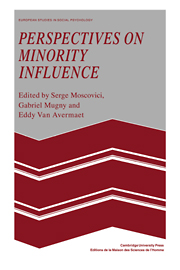Book contents
- Frontmatter
- Contents
- Contributors
- Preface
- Part I The process of minority influence
- Introduction
- 1 Innovation and minority influence
- 2 Social support and minority influence: the innovation effect reconsidered
- 3 Compromising public influence for private change
- 4 Conflict and conversion
- 5 Rigidity and minority influence: the influence of the social in social influence
- Part II Minority influence in groups
- References
- Subject index
- Author index
4 - Conflict and conversion
Published online by Cambridge University Press: 05 February 2012
- Frontmatter
- Contents
- Contributors
- Preface
- Part I The process of minority influence
- Introduction
- 1 Innovation and minority influence
- 2 Social support and minority influence: the innovation effect reconsidered
- 3 Compromising public influence for private change
- 4 Conflict and conversion
- 5 Rigidity and minority influence: the influence of the social in social influence
- Part II Minority influence in groups
- References
- Subject index
- Author index
Summary
Introduction
Social influence seldom proceeds without conflict and indeed without some suffering or discomfort, whether it entails the exercise of social control over the judgments and opinions of others or the recognition that one has, without being aware of it, adjusted one's own standards to incorporate an alien norm. One does not give in publicly to a group, or modify one's way of viewing the environment, without resistance and confrontations. When two points of view appear irreconcilable their respective sponsors are inclined to engage in conflict. They do not do so light-heartedly, since any questioning of the social consensus on this or that issue promises trouble and suffering for the future. What is more, as reality does not generally tolerate two definitions at once, this conflict will lead either to abandonment of the position and public conformity (during the interaction) to a norm not really accepted so as to reach agreement on the issue, or to the maintenance of the position (coming to terms only with oneself or one's own group), the other viewpoint being treated as the deviant or abnormal one.
Each of us has had occasion to wonder at such phenomena, observable in various areas of life, where populations modify their judgments, opinions or perceptions without being conscious of doing so; or else where they appear to be influenced on a social and verbal level whilst preserving beneath the appearance of consensus their original way of thinking about the world.
- Type
- Chapter
- Information
- Perspectives on Minority Influence , pp. 91 - 112Publisher: Cambridge University PressPrint publication year: 1985
- 4
- Cited by



